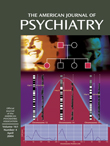Dr. Haukka and Colleagues Reply
To the Editor: The idea in our article was to test whether mutations that increase the risk of schizophrenia would also bring some advantage that would appear as increased fertility among the siblings of patients with schizophrenia. The classic example of heterozygous advantage is hemoglobin S, which is protective against severe malaria in heterozygotes but causes often fatal sickle cell disease in homozygotes (1). If we understand correctly, Dr. Procopio feels that our approach was wrong because the genetic background of schizophrenia is polygenic. However, according to a recent review on human genetic evolution (2), “The rate of trait evolution tells us nothing about the number of genes involved. The intensity of selection and heritability are more important determinants of evolutionary rate than is the genetic complexity of the traits under selection.” Given the strong selective disadvantage and high heritability of schizophrenia, our interest in whether the mutations predisposing to schizophrenia could also carry some advantage seems justified. We use the word “mutation” instead of “gene” to point out that we also believe that it is quite probable that the genes associated with liability for developing schizophrenia are quite useful but that the mutations within the genes that increase the risk of schizophrenia may not be useful and could be under selective pressure.
1. Kwiatkowski D: Genetic susceptibility to malaria getting complex. Curr Opin Genet Dev 2000; 10:320–324Crossref, Medline, Google Scholar
2. Carroll SB: Genetics and the making of Homo sapiens. Nature 2003; 422:849–857Crossref, Medline, Google Scholar



